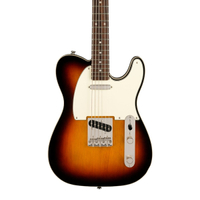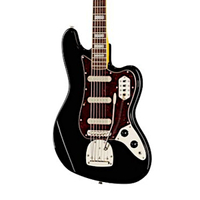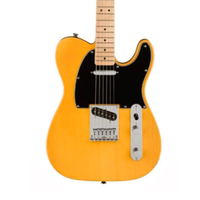Best Squier guitars 2025: 10 killer guitars that won’t break the bank
Want all the style and sound of the big ‘F’ without spending the big bucks? With these Strats, Teles, Jazzmasters, and more from Squier, you can do just that
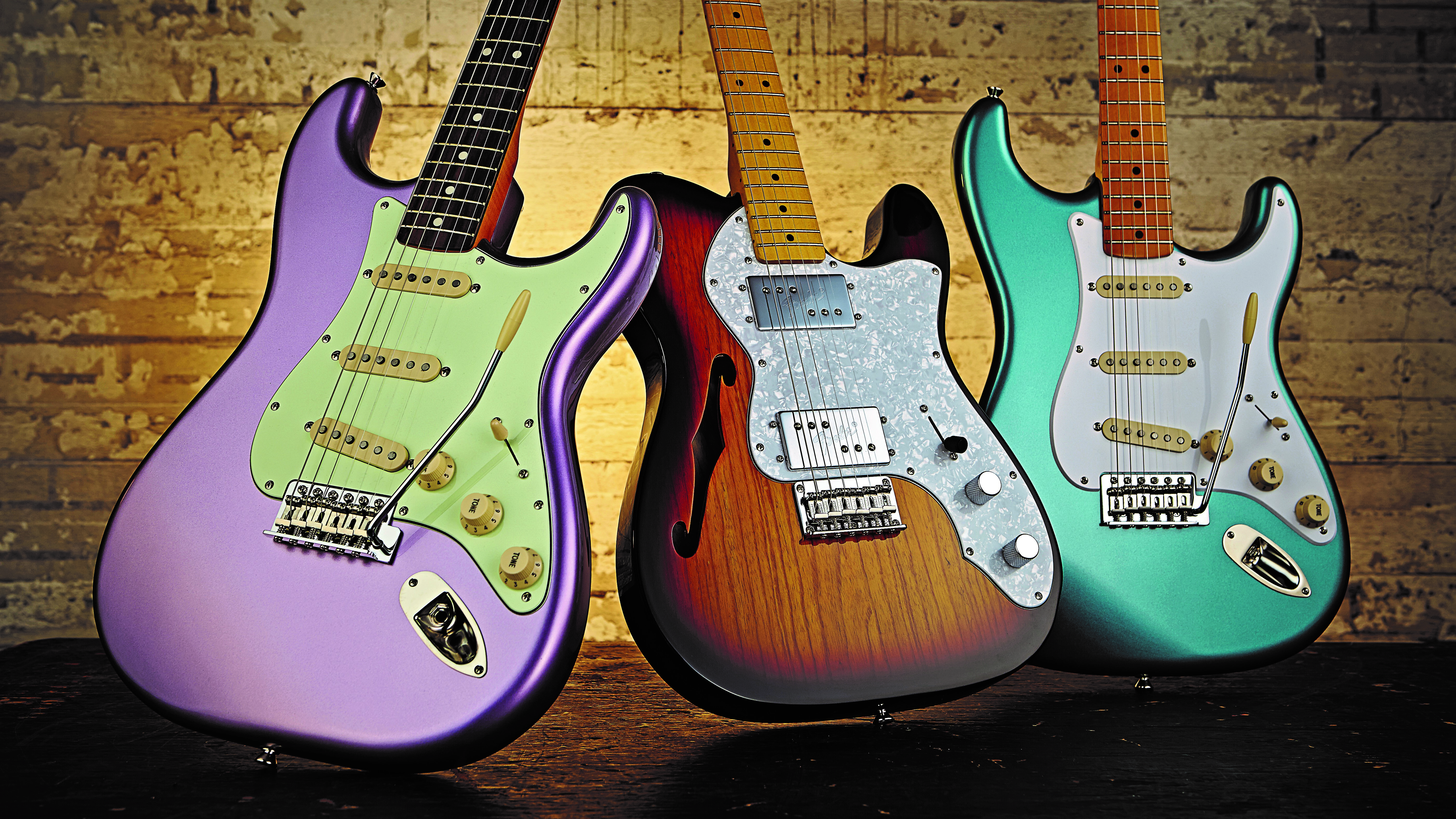
Since its launch in the early ’80s, Squier has made a strong claim and possibly shaped the guitar world more than most brands. Sure, even the best Squier guitars don’t match the craftsmanship of USA-made PRS or Fender models, but their influence is undeniable. More guitarists have started their journey with a Squier than more expensive brands, and that impact is impossible to ignore.
However, Squier is not just a brand that produces beginner or backup guitars to put up with until you can afford a 'real' Fender, though. Its Classic Vibe, Paranormal and Anniversary models – to name just a few – are high-quality instruments that will stand up to rigorous gigging, touring and recording schedules, and in my opinion, some can go toe-to-toe with their US counterparts.
Of course, Squier remains a top choice for beginners. The Sonic and Affinity ranges consistently top best-for-beginners lists, offering solid instruments that make learning enjoyable rather than frustrating. And thanks to major improvements in production quality, the days of budget guitars holding players back are well and truly over.
For example, the Squier Sonic Mustang offers excellent value for money thanks to its super-slim body, lightweight design and above average audio delivery, while the beginner-friendly Squier Sonic Stratocaster offers new players everything they need to grow and learn for an amazing price.
Along with my picks, I've included in-depth buying advice at the end of this guide, so if you’d like to know more before picking up a Squier guitar, take a look below. If you’d rather just get straight our product picks, keep scrolling.
Our top picks
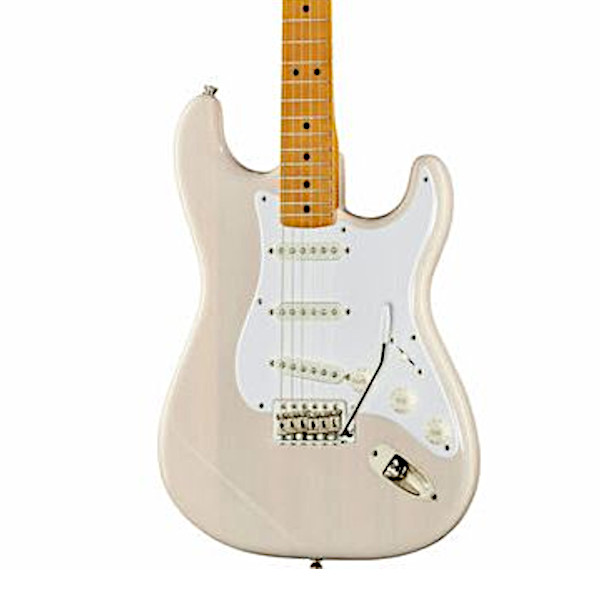
The body of the Classic Vibe ‘50s Strat is made using pine and, along with features such as the 2-colour burst and Narrow Tall frets, they all combine to give the CV ‘50s Strat a fabulous vintage style. It's well-balanced, delivering bite at the top end and low-end warmth, while the three single-coils with five different selections makes this one of the most versatile guitars around.
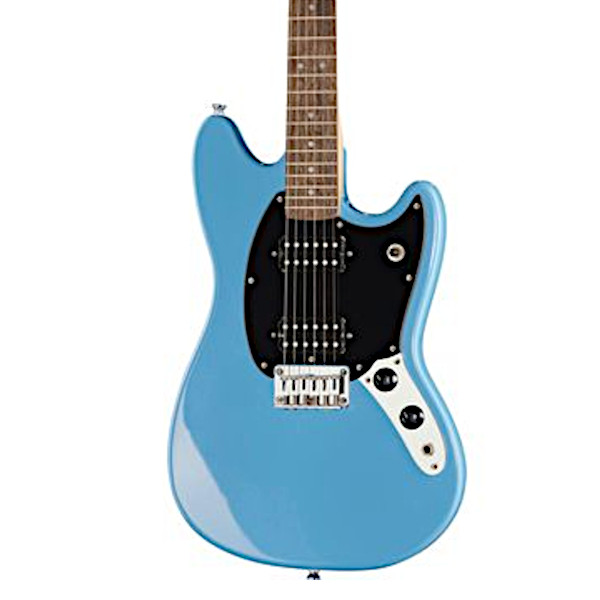
If you're on a tight budget but still want an excellent option from Squier, then the Sonic Mustang is definitely worth a closer look. It's lightweight, a joy to play thanks to the smooth maple neck. It's a workhorse of a guitar, and I'm sure it will handle any of your clean or distorted needs with relative ease. Just be aware this is considered a ‘short-scale’ guitar so those with large hands might struggle.
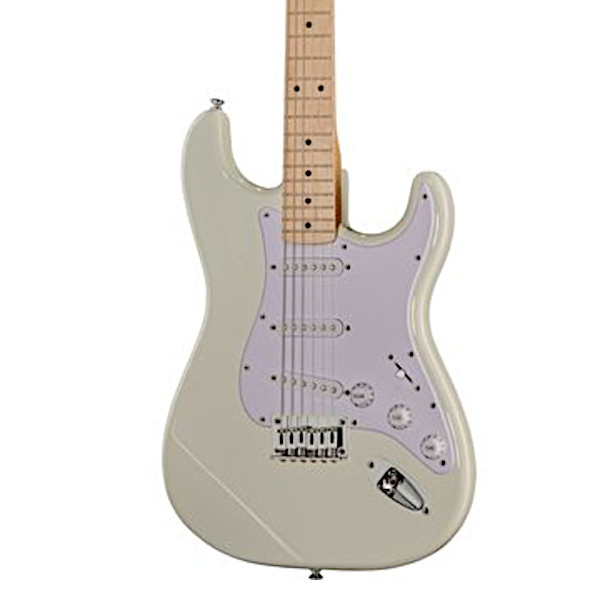
Squier’s Sonic range of guitars are perfect for new players entering the world of electrics, giving those eager to learn all the tools and features they’ll need to start mastering the art. The Squier Sonic Strat has a poplar body and maple neck, making the guitar lightweight. It might now have the warmth of higher price Strats, but it's an excellent all-round choice. Highly recommended.
Best overall
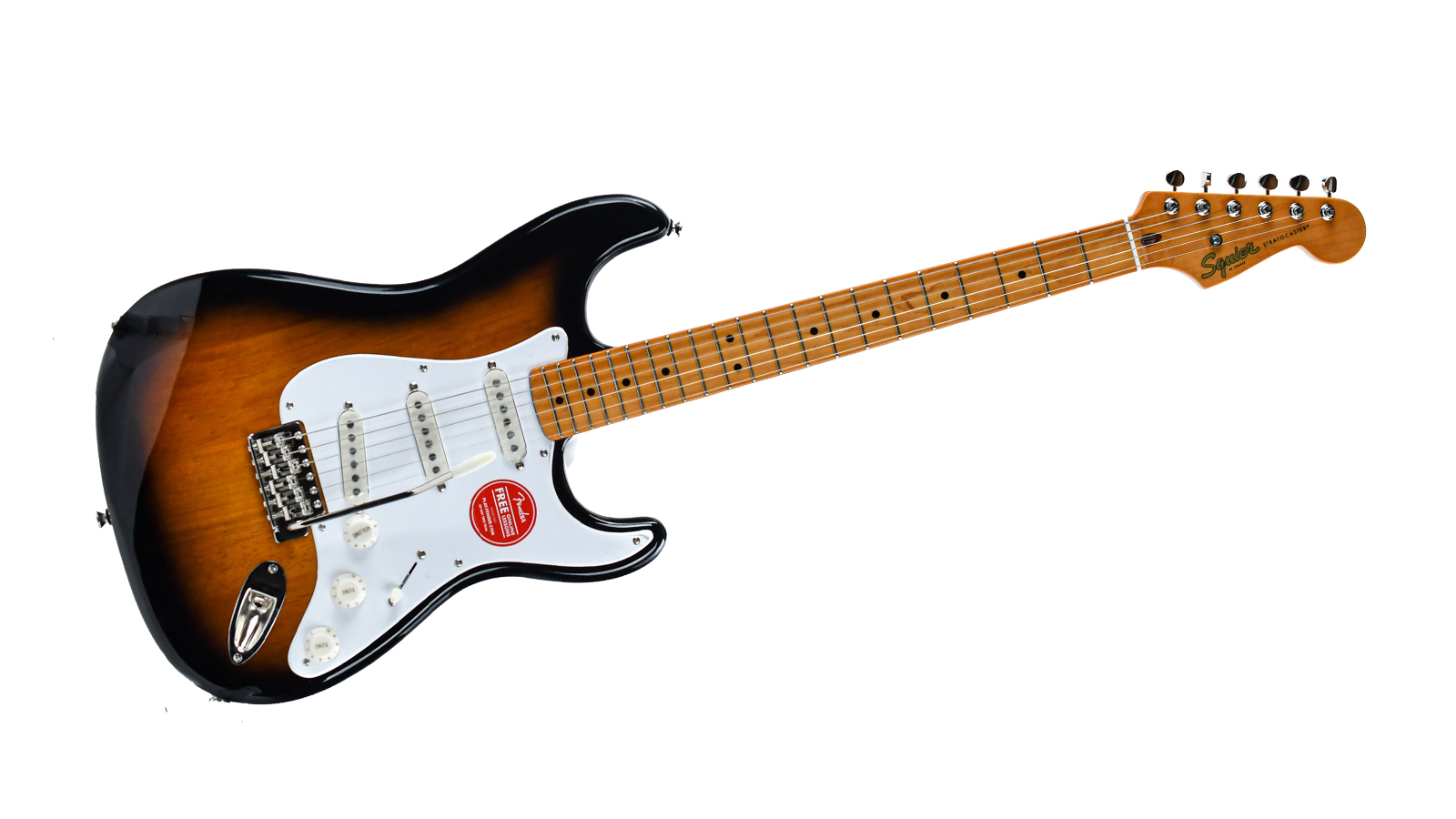
1. Squier Classic Vibe ‘50s Stratocaster
Our expert review:
Specifications
Reasons to buy
Reasons to avoid
✅ Buy if you're after a great-sounding guitar with a classic look: The Classic Vibe ‘50s Stratocaster is my go-to Squier thanks to its smart looks, excellent build quality and balanced delivery.
❌ Avoid if you're looking for a more modern look: The design and vintage vibe won't be for everyone, but that's just a minor quibble.
Build quality rating: ★★★★★
Playability rating: ★★★★★
Sounds rating: ★★★★½
Overall: ★★★★★
The Squier catalogue is packed with impressive Stratocasters at all price points, but none quite hit the spot like the Classic Vibe ‘50s Strat. As a modern-day throwback to the guitar that started it all, I can’t think of anything better.
The Classic Vibe range of guitars from Squier continues to impress with its build quality, looks and overall feel. The body of this guitar is made of pine - something I've not seen since Fender’s early days - and it's these touches, along with features such as the 2-colour burst and Narrow Tall frets, that give the CV ‘50s Strat a killer vintage vibe and style.
The pickups also play a role in this, delivering all the brightness, bite and top-end - as well as some rich mid and low-end warmth - you’d expect from a Strat. Three single-coils with five different selections makes the Strat one of the most versatile guitars around - and this Classic Vibe ‘50s is no exception.
If you’re a budding beginner or engrossed intermediate, the CV Strat will do all the things you need from a guitar - and might even cut the mustard at some more high-brow gigs.

"The Squier Classic Vibe ‘50s Stratocaster has a faultless build and one that captures that signature Strat sizzle."
Read more: Squier Classic Vibe Stratocaster '50s review
Best budget
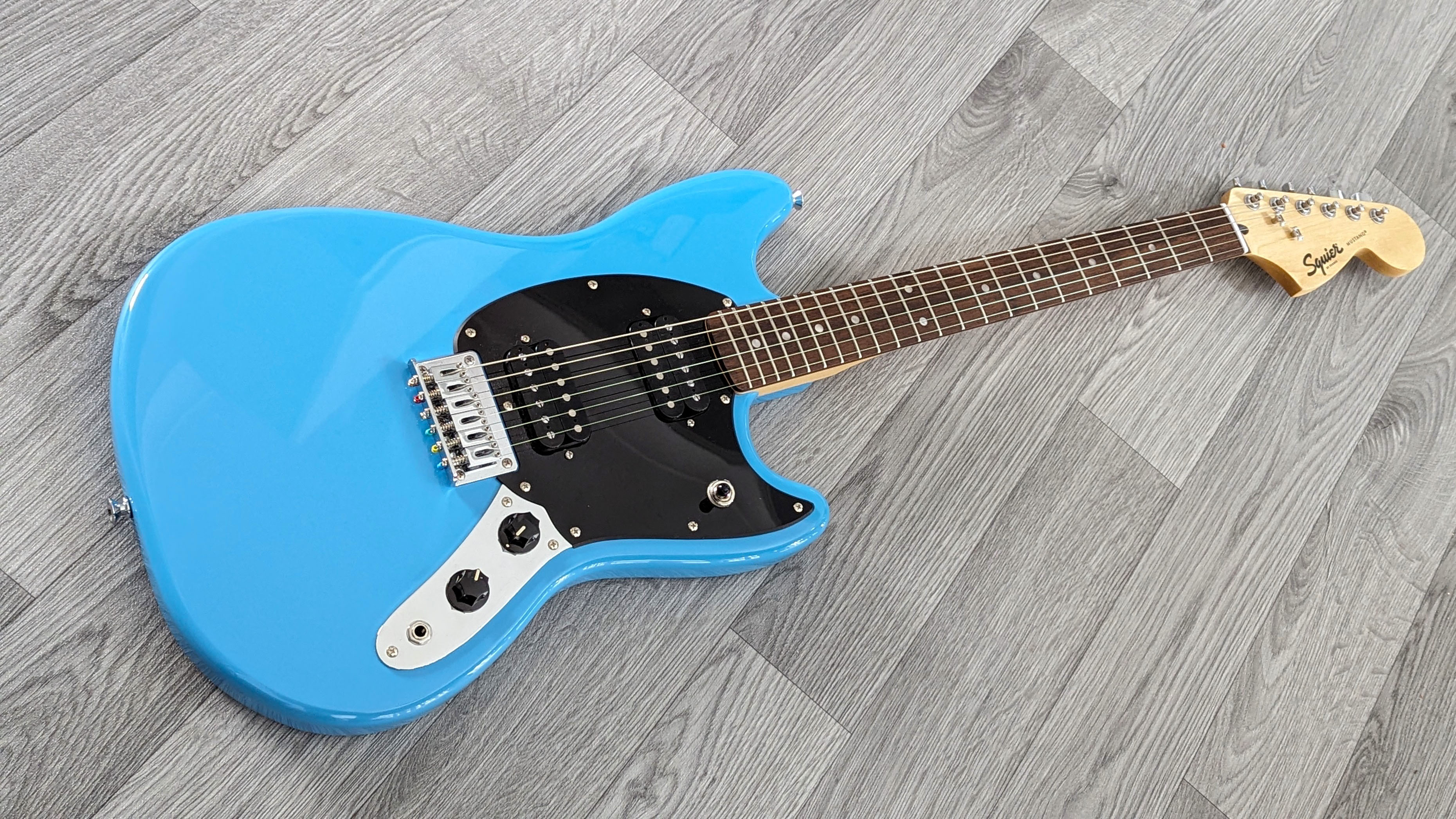
2. Squier Sonic Mustang
Our expert review:
Specifications
Reasons to buy
Reasons to avoid
✅ Buy if you're on a budget but still want something special: The Sonic Mustang gives you maximum bang for your buck and it would also be great for newcomers.
❌ Avoid if you have larger hands: This is a "short scale" guitar, so if you have larger hands, staying comfortable while playing may be a struggle
Build quality rating: ★★★★
Playability rating: ★★★★
Sounds rating: ★★★★½
Overall: ★★★★½
If you are a player who is just getting started, then anything from Squier’s Sonic range will do just what you need. It is full of great electric guitar options including Strats and Teles, but it is the Sonic Mustang which I enjoy the most. What you get for your money is excellent and it's lightweight, easy to play and with no major concerns when it comes to tuning stability and set-up.
The poplar body is super slim and lightweight, the maple neck is smooth and comfortable and the hardtail bridge and solid tuners work in conjunction with each other to keep tuning and intonation issues to a minimum. This Mustang – with the aforementioned hardtail and a pair of Squier ceramic humbuckers – is a workhorse of a guitar, and will handle any of your clean or distorted needs with relative ease.
The Sonic Mustang – like all Mustangs – is what we would consider to be a ‘short-scale’ guitar. This means that the scale length (the distance between the bridge saddles and the nut of the guitar) is shorter than the usual Fender-style scale length of 25.5” by an inch and a half.
It doesn’t seem a lot, but it makes a notable difference to the string tension and makes the guitar feel a bit easier to play as a result. There is also less distance between frets – something which will suit smaller players well. If you have big hands you might struggle, but fear not; there are plenty of full-scale options on the market too.

"An excellent value electric guitar that offers a really positive playing experience for developing guitarists – and especially younger ones. The Mustang shape, versatile pickups and a very comfortable neck help to make this one of the best guitars for beginners available."
Read more: Squier Sonic Mustang review
Best beginner
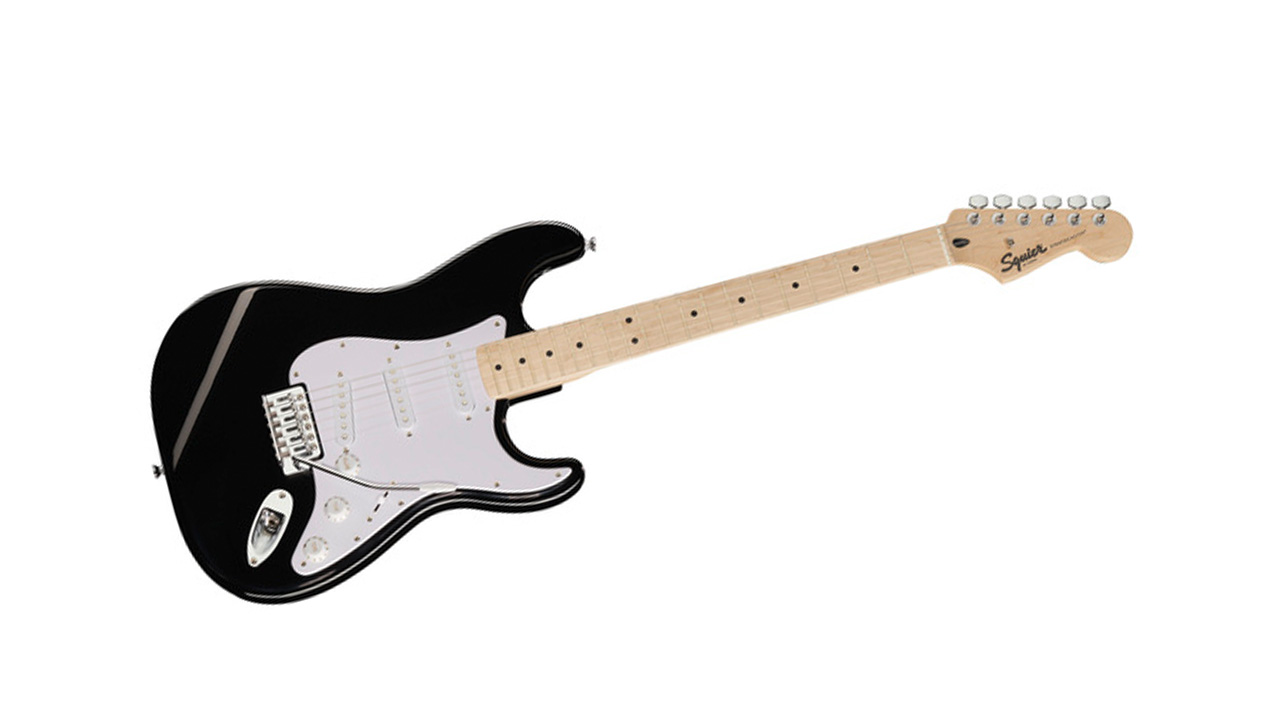
3. Squier Sonic Stratocaster
Our expert review:
Specifications
Reasons to buy
Reasons to avoid
✅ Buy if you're in the market for your first guitar: The Squier Sonic Stratocaster has everything in place to get you started. It's also lightweight but remains a robust piece of kit
❌ Avoid if you're an experienced player: If you've been playing for a while, paying a bit more will get you a better model with more balance.
Build quality rating: ★★★
Playability rating: ★★★★
Sounds rating: ★★★★
Overall: ★★★★
Squier’s Sonic range of guitars is the perfect beginner electric guitar, delivering new players all the tools and features they’ll ever need to start mastering the art of playing the electric guitar. It’s Squier’s entry-level range, but the instruments are by no means cheap electric guitars, neither tacky nor unpleasant.
The Squier Sonic Strat is equipped with a poplar body and maple neck. The poplar body is exceptionally lightweight, and the maple neck with laurel fingerboard enables players to get all of that bolt-on, Strat ‘snap’ on a tight budget. The poplar body isn’t quite as resonant as other Strats of a higher spec, but this guitar makes up for that with impressive playing comfort.
The area in which most budget guitars suffer the most is hardware – and while the hardware on the Sonic Stratocaster isn’t winning any awards, it’s relatively strong and secure.
Lastly, the new Sonic range has introduced never-before-seen finishes like the eye-catching Ultraviolet. For beginners, or those on a small budget, this guitar will do the job nicely.
Best shredder
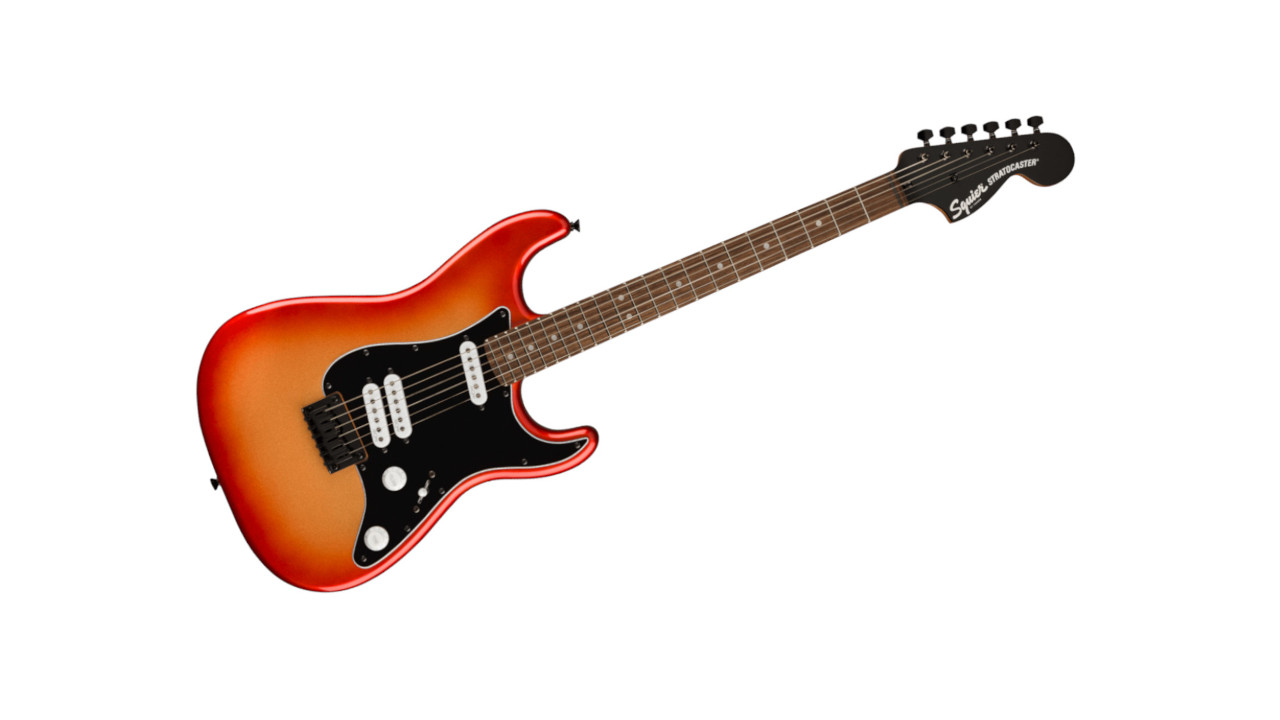
4. Squier Contemporary Strat Special HT
Our expert review:
Specifications
Reasons to buy
Reasons to avoid
✅ Buy if you're a metalhead looking for a distinctive tone: With its SQR single-coils, the Squier Contemporary Strat Special HT sounds fab and is just the ticket for a metal fan looking for a new axe.
❌ Avoid if furious shredding isn't your thing: Those looking for a little more warmth and a more relaxed tone should turn their gaze elsewhere.
Build quality rating: ★★★★
Playability rating: ★★★★
Sounds rating: ★★★★
Overall: ★★★★
Squier's Contemporary series offers a range of modern takes on classic guitars that we've not seen before from Squier. You'd be mistaken for thinking there are plenty of hot-rodded Strats on the market already, but at this price point, there is definitely room for one more.
Even though this guitar has all the shred-friendly accoutrements such as the super hot pickups, sculpted neck heel, series wiring in the middle and bridge position and 12" fingerboard radius, which make it one of the best metal guitars around, you'd be surprised at just how versatile this thing is.
Sure, the SQR single-coils handle gain with ease, but they also deliver classic Strat-like chime. You’d be forgiven for thinking the bridge pickup is a humbucker – however, it’s actually the middle pickup’s placement, much closer to the bridge, that creates a uniquely sharp and distinctive tone not found on many other current models.
This guitar feels, sounds and looks like a brand new, contemporary take on the Strat, and for that, I have to take my hat off to Squier. It's not every day you redesign and update such a classic, iconic guitar, and it needs to be done just right - much like this one.
Best offset
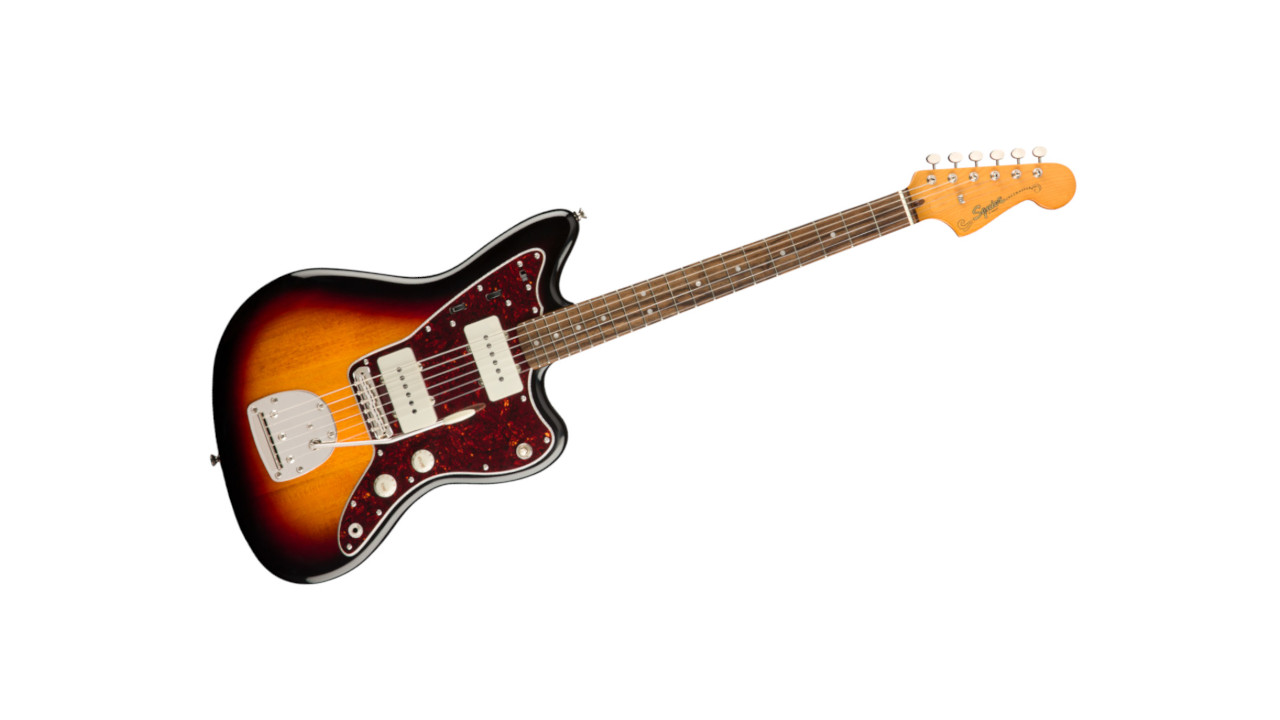
5. Squier Classic Vibe ‘60s Jazzmaster
Our expert review:
Specifications
Reasons to buy
Reasons to avoid
✅ Buy if you're after an iconic look and vintage vibes: The Squier Classic Vibe ‘60s Jazzmaster is perfect for throwback playing - and it's available for a great price.
❌ Avoid you want something more than a classic sound: Vintage characteristics aren't for everyone, so if you're more modern leaning, then the Jazzmaster might not float your boat.
Build quality rating: ★★★★
Playability rating: ★★★★
Sounds rating: ★★★★½
Overall: ★★★★
There are few Fender guitar shapes more iconic than the Jazzmaster. Originally released in 1958 as a solid-body competitor to guitars from the likes of Gibson, the Jazzmaster didn’t quite hit the mark – and it wasn’t until the surf-rock scene latched on to it that the JM got the recognition it rightfully deserved.
Luckily for us, the Jazzmaster today has never been more popular, and its inclusion in the Classic Vibe range for so many years proves this happily. This ‘late ’60s’ model is the most current edition to the Jazzmaster CV roster, and with vintage style machine heads, a 4-ply tortoiseshell guard and complex and sophisticated electronics, this guitar has a proper ’60s soul – without getting too expensive, rare or just plain unplayable.
Squier has had to make some era-based sacrifices though. The neck is a reasonably slim-feeling ‘C’ shape – a more modern touch – and the fingerboard radius is a middle-of-the-road 9.5” as opposed to a more vintage 7.25”. These aren’t necessarily bad things, though, as these latest CV Jazzmasters are considerably more playable than their ancient predecessors.
If you’re a stickler for authenticity, then this might not be for you – but if you want an offset guitar that looks and sounds old, without playing like it is, then this is the one for you.
Best semi-hollow
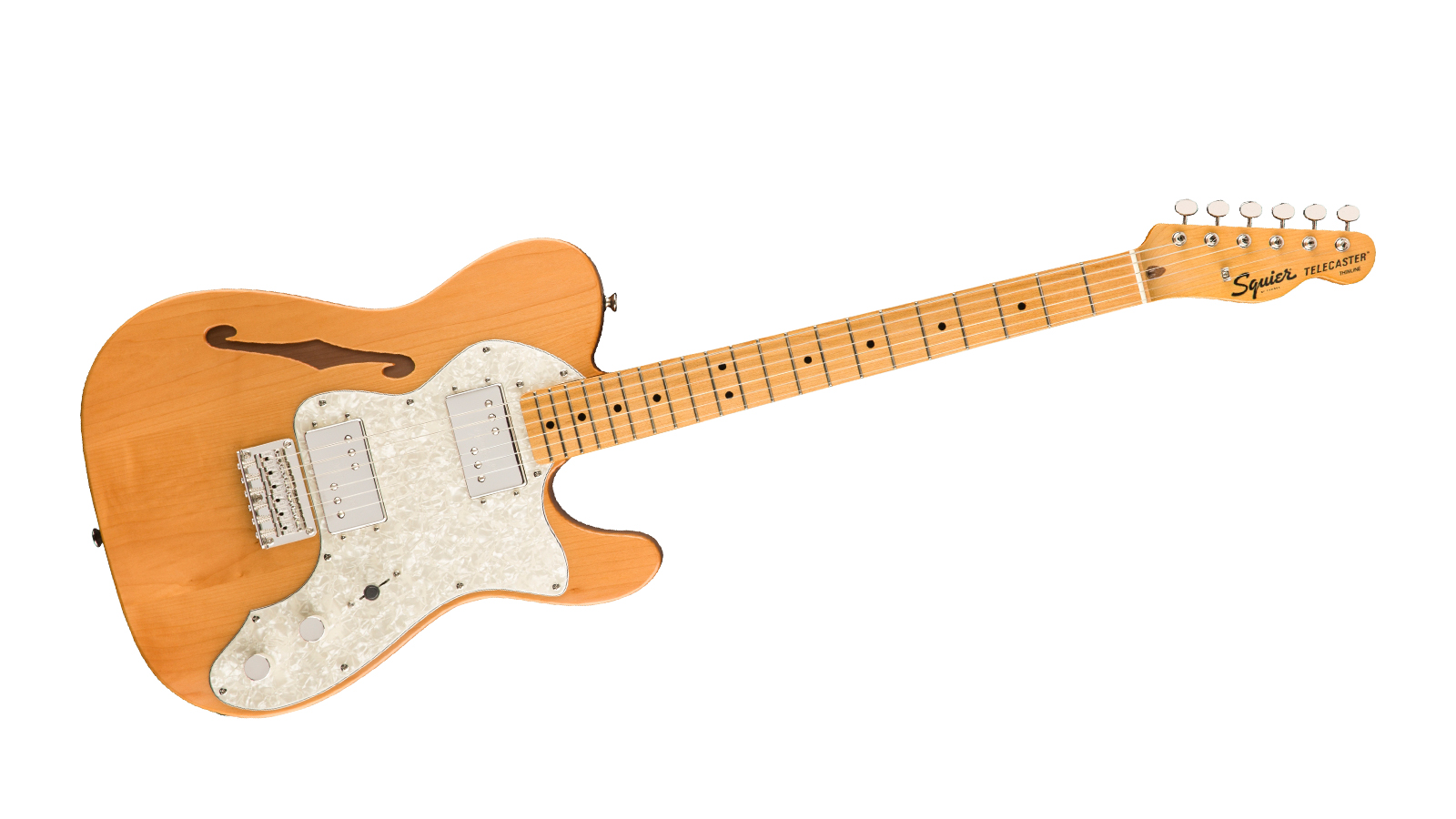
6. Squier Classic Vibe ‘70s Telecaster Thinline
Our expert review:
Specifications
Reasons to buy
Reasons to avoid
✅ Buy if you're after that old school "twang: The Thinline has some of the best pickups in any guitar in the range and they deliver thick, open, and wide sound.
❌ Avoid you want a guitar to play very loud: I noticed some feedback when putting the Thinline through its paces at high volume, but it wasn't enough to really interrupt my jam session.
Build quality rating: ★★★★
Playability rating: ★★★★★
Sounds rating: ★★★★½
Overall: ★★★★★
You may be wondering why this pick isn’t a solid-body, seeing as I'm looking at Squier guitars. Some of the most underrated Fender and Squier electric guitars are semi-hollow guitars - with the Thinline Telecaster, in my opinion, being the most misunderstood guitar in the Squier product catalogue.
The Thinline Tele has that special something to it which sets it apart from the rest of the pack - besides there being a big empty space in the body. The tone that is produced still has whispers of that old-school Tele vibe; the ‘twang’ - but the semi-hollowness of the guitar coupled with the pair of wide-range humbuckers brings a whole new thing to the party.
These are, in my opinion, some of the best electric guitar pickups available in any guitar. It sounds thick, open, wide - all of the tones you’d associate with a semi-hollow guitar - but the humbuckers, unlike others, provide astonishing clarity. None of the compressed, woolly tones you’d usually associate with a pair of cheap humbucking pickups.
The Sunburst and Natural finishes are both gorgeous, with a really attractive grain showing through on both occasions - and with an Olympic white ‘FSR’ model lingering around for a limited time too, there’s bags of opportunity to take home something a little bit different that will blow your mind.
Yeah, there’ll be a bit more feedback than usual at higher volumes, but not enough to really interrupt a gig or practice session.
Best for rock
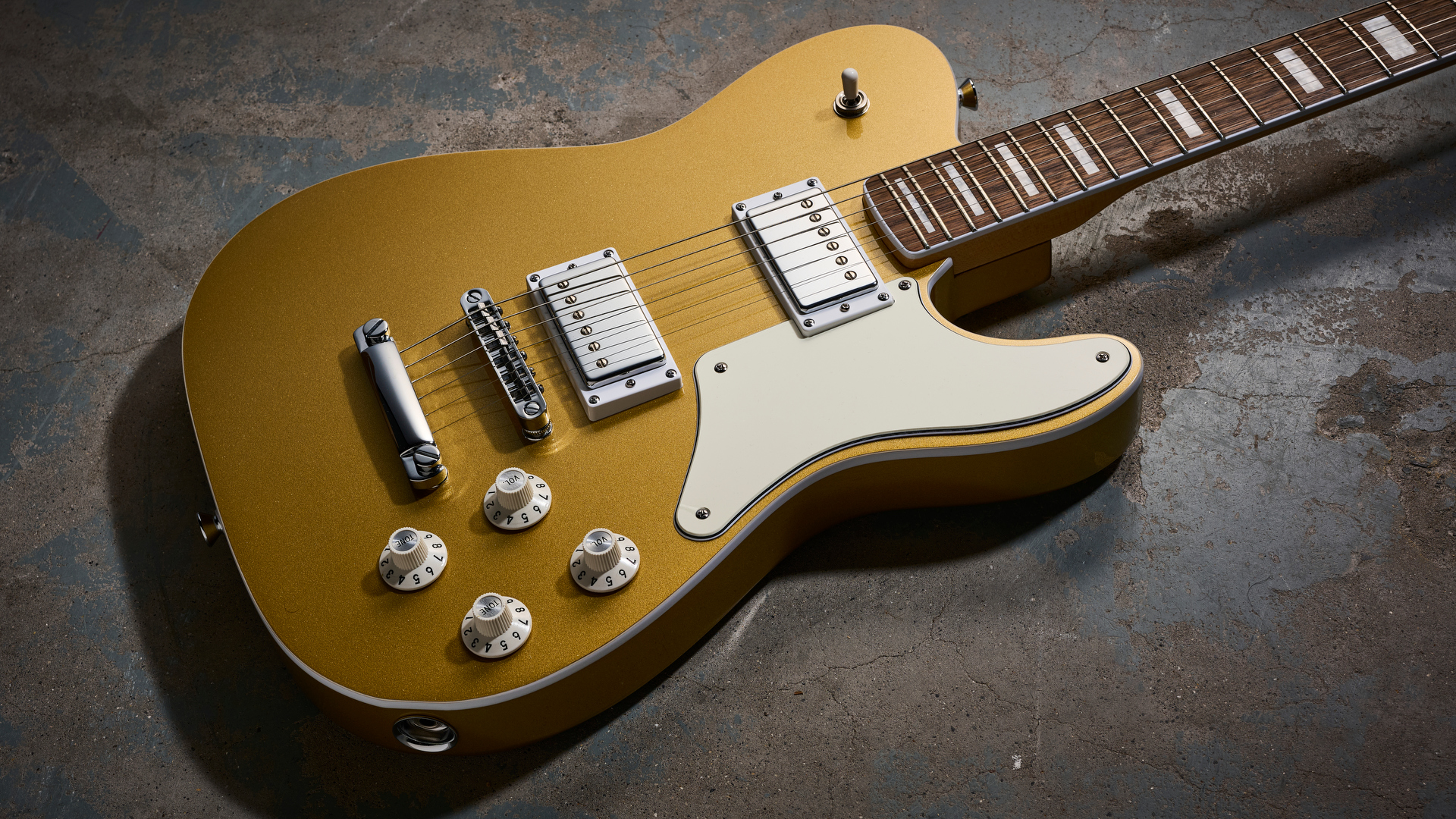
7. Squier Paranormal Troublemaker Telecaster Deluxe
Our expert review:
Specifications
Reasons to buy
Reasons to avoid
✅ Buy if you want punch and warmth from your playing: The Paranormal Troublemaker Telecaster Deluxe punches far above its weight and is a top option for rock musicians who want great sound without breaking the bank
❌ Avoid you want a selection of cool finisheds: Sure, the Aztec Gold finish looks amazing, but if you'd like a few more options, then you're out of luck.
Build quality rating: ★★★★★
Playability rating: ★★★★½
Sounds rating: ★★★★★
Overall: ★★★★★
Part of Squier’s Paranormal series, the Troublemaker Telecaster Deluxe is a tongue-in-cheek model that is far more than just a gimmick. But how can a guitar cause mischief? Well, that is down to Squier ‘borrowing’ a few features usually found on another brand’s most famous models (cough-Gibson-cough).
Jokes aside, the Troublemaker is essentially a Telecaster Deluxe, but with a few unmistakably Gibson-like touches, including a Tune-o-Matic-style bridge, stop tailpiece, and Fender’s take on a Goldtop-inspired finish. The included humbuckers pack plenty of punch and warmth, while coil splits in the tone control add serious versatility.
The Goldilocks C-shape neck plays like a dream, and details like the bound laurel fingerboard with pearloid block inlays, ’70s-style oversized headstock in matching gold and skirted amp control knobs give it a serious dose of style.
The Troublemaker Telecaster punches well above its weight – and if you closed your eyes, you’d swear you were playing something twice the price.

"The Squier Troublemaker fuses classic Fender Telecaster Deluxe design points and a few Gibson-style features with great aplomb. If you’re looking for a humbucker-loaded guitar (with coil splits) but want extra scale length and the ‘snap’ of a Fender, this will do it in style, regardless of the genre you play."
Read more: Squier Paranormal Troublemaker Telecaster Deluxe review
Also consider
The above models are my top choices when it comes to the best Squier guitars, but that doesn’t mean the list ends there. Below, you’ll find another 3 Squiers that I think are still well worth considering if you’re after a new guitar.
Squier Classic Vibe Baritone Customer Telecaster ★★★★½
An neat baritone choice for a great price
If you’ve ever wanted to try a baritone guitar, but didn't think you could justify the cost, then this is just the ticket. The scale length is 27”, which does take a bit of getting used to - but thankfully, the sound is so good that it’s a real pleasure getting to grips with this guitar. The neck is a slim ‘C’-shaped maple affair, like most standard Telecasters, while the stock strings are .014 -.068, which cater nicely to the baritone tunings of B standard and Drop A, and I was surprised at how well the seemingly standard Tele pickups handled such low end.
Squier Classic Vibe Bass VI ★★★★
A guitar-bass hybrid that you need in your setup
The Classic Vibe Bass VI is a funky looking and sounding thing. From a distance it looks like a guitar, and up close, it looks like a bass guitar - and to be honest, it's kind of neither of those things, but also both of those things at the same time. Let me explain. It's essentially a regular electric guitar, tuned an octave lower. As such, the string gauge is a hefty .024-.084, and the scale length is a full 30 inches - the same as a short scale bass. It has three Fender designed single-coil pickups, Jazzmaster-style tremolo and slim 'C'-shape neck. Be aware that because the strings are so fat, the fingerboard does get a little crowded at the lower frets.
Squier Affinity Telecaster ★★★★
Sweet Tele tones which sound more expensive than they are
The Affinity range from Squier is really the entry point for anyone who wants a truly classic interpretation of a Fender guitar at a beginner friendly price point. There's no ultra slim, lightweight bodies or necks here - just a full-fat Tele at a low price. This Affinity Telecaster has all of that Tele vibe that we love to see and hear, thanks to the combination of a poplar body and maple neck. The pickups are ceramic single coils, which help to give this guitar some extra tonal guts - and you hear it especially when playing away on that bright, punchy bridge pickup.
FAQ
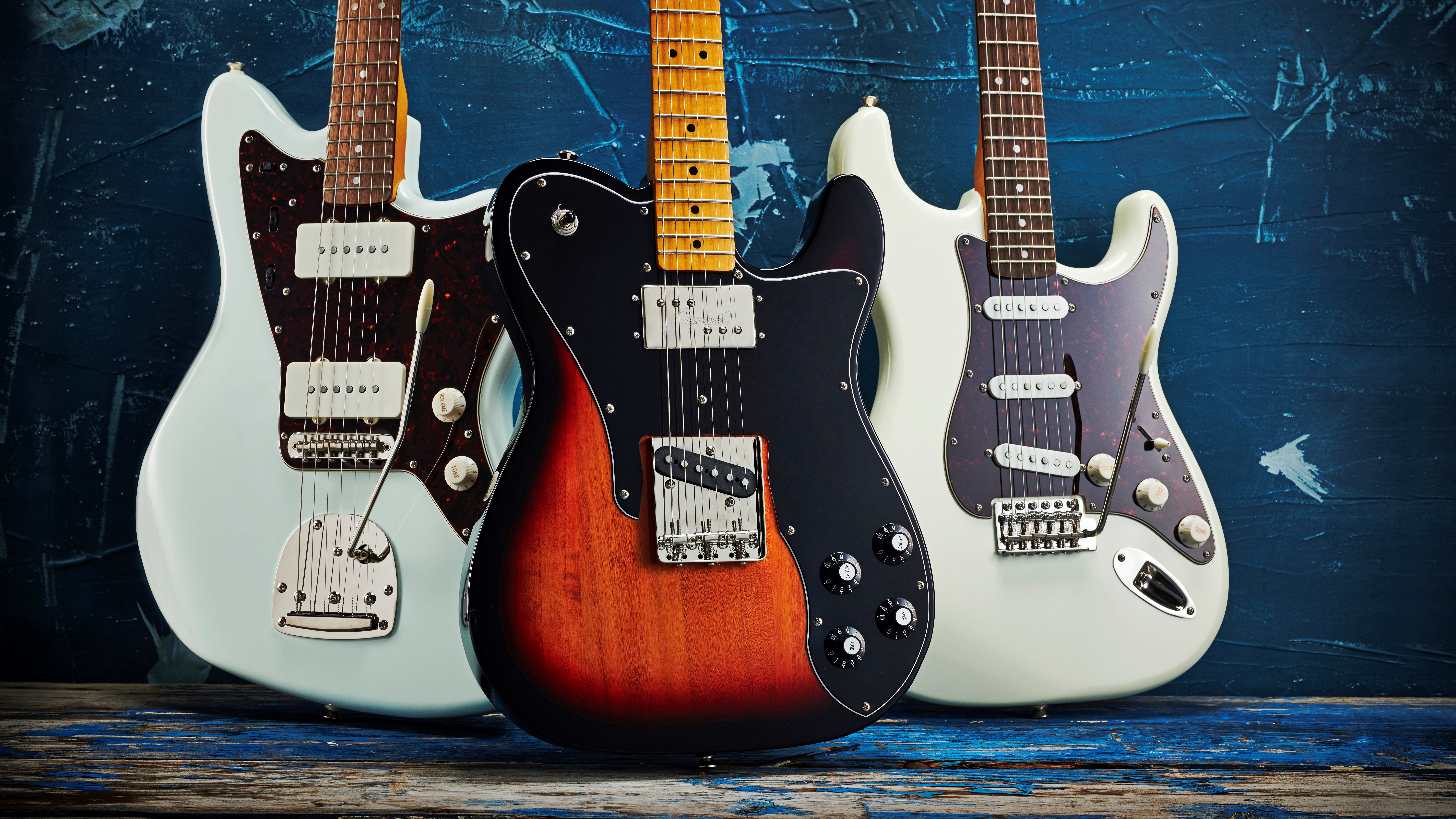
Why should I buy a Squier?
It’s a good question, to be honest. There’s never been a better time to buy a cheap or budget-friendly electric guitar - with many brands and manufacturers producing great products at an alarming rate - so why should you opt for one of the best Squier guitars over anything else?
One of the best things about Squier is its consistency. Virtually every single guitar that comes out of a factory with Squier on the headstock is of a high standard for the price bracket in which it falls under. For these respective price brackets, the finishes are impressive, attention to detail is high and the overall feel of the instruments are generally superior over other guitars.
Although Squier is the name on the front of the headstock, every single one has ‘Fender’ written on the back of it. As such, the backing of such a major brand gives you - or anyone looking to buy a Squier guitar - the reassurance that whatever Squier you choose, it’s going to be impressive.
Another pro for Squier is the fact that it’s able to reproduce Fender guitars faithfully at a lower price point. For any young guitarist (or old, for that matter), we’ve likely got a guitar hero or idol who’s been seen wielding a Fender guitar. We don’t know about you, but we definitely don’t have a ‘guitar hero’ kind of budget available - so knowing that we can get 99% of the way there for less than $/£500 is a huge bonus. Want be like David Gilmour, Jim Root or Kurt Cobain but don’t have four digits lying about? Squier is your friend.
Some artists - Jim Root included - even struck deals with Fender to make cheaper Squier versions of their signature models, ensuring that there’s something appropriate for fans of all ages, ability levels and bank balances.
What’s the difference between Squier and Fender?
While Squier is owned by Fender - and they both make near identical instruments - the companies are separated by a few different factors.
The first - and main difference - is that they're built in different places. While production began in Japan, Squier guitars are now manufactured in China and Indonesia - as opposed to Fender guitars hailing from Mexico, Japan and the US. This enables Fender to produce Squier guitars at a much lower cost - and therefore, sell them to you at a lower retail price.
There are some qualms and questions surrounding the build quality of guitars made in the Far East over those made in the US and Mexico - and while those qualms may have been entirely valid five to ten years ago, nowadays, not so much. We’d argue, in fact, that if you spend Squier money on a guitar made in the US, it wouldn’t be that great - as the cost of labour and manufacturing would bump up the price of a cheap guitar considerably.
The second main difference is the quality of the materials. Fender earmarks nearly all of the best wood, hardware and finish options for its Fender-branded instruments, which means that Squier guitars are built mostly from cheaper cuts of Basswood, Poplar or Pine, and are equipped with cheaper hardware which is a bit less heavy duty. This sounds a lot worse than it is though, as the quality of some of Squier's nicer materials and hardware (especially the stuff found on the more expensive models) is still much higher than guitars of a similar price point.
What are the Squier product ranges?
MusicRadar's got your back
Take a closer look at the highlights of Squier's product range:
Bullet
The Bullet series is the most affordable range of Squier guitars on the market, and includes Stratocaster, Telecaster and Mustang models. The main aim of the Bullet series is to enable young or beginner players to own an instrument that looks, sounds and feels good without costing the earth. Don’t expect something mind-blowing - but a Bullet will definitely help get you started.
Affinity
Squier’s Affinity range of guitars is all about giving players a beginner-friendly platform to start playing, but with a slightly higher level of finish than the Bullet series - hence the higher price. There are Stratocaster, Telecaster and Jazzmaster options available in the ‘core’ range, each with a more traditional spec and approach - and then usually some more interesting models such as a Tele Deluxe or a humbucker-equipped Strat which change more regularly.
Classic Vibe
The Classic Vibe range consists of higher spec vintage-inspired models. They're loosely based on '50s, '60s and '70s Fender designs, and are finished to a higher level than their cheaper Squier counterparts. The Classic Vibe range has always been one of the best, but in recent years we've seen Squier really close the gap with the Fender-branded instruments in terms of build and sound quality and overall feel.
Paranormal
Squier's Paranormal Series consists mostly of more budget-friendly reissues of some of Fender's cult classics from recent years. It's something of a testing ground for Squier; an opportunity for them to produce fairly small numbers of something crazy for those who want it. It's a great opportunity to find something you never knew you wanted, at a price point that allows you to take a chance on something every now and then.
The return of old-time Fender favourites like the Toronado and Super-Sonic has been really nice to see, and brand new Squier models like the Baritone and Offset Telecasters, while pretty wacky, have found themselves becoming popular.
Contemporary
The Contemporary series, as you'd probably expect, offers modern specs, unique pickup, hardware and setup configurations and ultra-playable neck profiles and radii for those who wish for something a little less traditional. These guitars are often equipped with coil-splittable humbuckers - in some cases active ones - as well as Floyd Rose locking tremolos, and stealthy hardware and finishes.
They're great for metalheads - and we'd assume from looking at the spec sheet that this is who Squier are aiming the Contemporary series at. They're also, suprisingly enough, very versatile guitars when it comes to clean playing too as the high-output pickups produce sparkling clean tones with lots of power and precision.
These guitars are seriously cool, and as Squier likes to change around their models every couple of years, they could also become pretty rare.
FSR
FSR means 'Fender Special Run'. They, shockingly, started with Fender, but Squier has now also joined the party when it comes to making limited edition, not-for-long models of guitars. They don't hang around, but Squier seems to be changing its FSR ranges a few times a year right now so you should always find something special in amongst the selection.
40th Anniversary
Squier was founded in 1982, making 2022 its 40th anniversary. As a result, Squier is celebrating with a range of high-spec models finished in special colours and featuring anodised scratchplates. They're considered to be some of the best Squier guitars ever made - a fitting compliment for a company who's celebrating a big milestone in such style - but there's some real weight behind that claim.
The anniversary models are priced around the $/£400-$/£500 mark, but for that you get some of the most special Squier guitars that have ever existed. After 2022, they'll be gone - 41st anniversary doesn't really have the same ring to it.
How we test
When it comes to guitars, there’s no doubt that personal preference comes into play while playing, testing and reviewing them - and this guide to the best Squier guitars is so different. However, when evaluating the instruments, there are several key criteria every Squier model has to meet before myself and the MusicRadar team recommend them to you.
We take build quality seriously as we know you’ll be playing your Squier guitar constantly. How comfortable they are to play, how robust they are, how they perform and how the frets feel are important factors we have to take into consideration. We need to be happy that nothing feels “off” and if there is an issue with a particular model, our team of experts will let you know.
We also check how easy the guitar is to set up, whether its best suited for a new player or a more experienced musician, does the guitar represent good value for money, and take a close look the level of finish of the guitar to make sure everything is as the manufacturer intends.
The way the guitar sounds is hugely important and our team of experts play a variety of different styles to see where the strengths and weaknesses lie.
Ultimately, we want to give you all the information you need so you can purchase your preferred Squier guitar with confidence.
Find out more about how we test music gear and services at MusicRadar.
Why you can trust us
✔️ More than 9,500 reviews on-site
✔️Over 17 years of product testing
✔️ 2.9 million monthly users globally
MusicRadar has been going since 2007 and has been helping to guide people on their musical journey since then.
The site is run by musicians for musicians and our team of experts regularly write in-depth gear round-ups and high-quality and authoritative reviews, to help steer you in the right direction when it comes to picking up a new instrument, pedal, studio software and more.
MusicRadar also interview world-renowned musicians, asking them to explain what goes into the creative process, the gear they use and their tips and tricks - all to give music fans an insight into how music is crafted.
We also provide excellent tuition, from bite-sized tips to advanced techniques and guidance from recognised musicians.
Thanks to you, we receive three million visitors per month, making us the one-stop shop for music makers and lovers worldwide - and we also feature content from our magazine titles such as Future Music, Computer Music, and eMusician.
Meet the experts

Ross has been a music lover and guitar player since the age of 8. He has spent the five years since graduating from university working in music retail, selling guitars, amps and more. Ross is particularly interested in electric guitars, pedals and amplifiers and his current rig includes a trusty 2009 American Standard Stratocaster and Vox AC30S1 with a few Walrus Audio and Way Huge pedals in between.

James is a freelance writer and former Junior Deals Writer at MusicRadar. Before writing, James worked as a guitar salesman at a local music store, so he knows a thing or two about matching people with their perfect instruments. James also has experience working in other areas of the music trade, having worked for the online music distributor, RouteNote. James is a guitarist, bassist and drummer and has also toured the UK and Europe with his old band Hypophora.
Latest updates
Recent updates
27/02/25: The guide has been updated with four new products: Squier Sonic Stratocaster, Squier Contemporary Strat Special HT, Squier Classic Vibe ‘60s Jazzmaster and the Squier Paranormal Troublemaker Telecaster Deluxe. Added "Our Top Picks" section to the start of the guide. Expert verdict boxes added to product entries where applicable along with "at a glance" boxes added to all products highlighting clear pros and cons. Star ratings measuring build quality, playability and sound also inserted. We've also included three additional Squier guitars to a section titled "Also consider". A section focusing on how MusicRadar tests products, alongside a piece detailing why you can trust MusicRadar are also now included. Finally, a "meet our experts" section is now featured so you can get to know who has contributed their expertise to this guide.
Read more
- Pair your Squier with one of the best budget guitar amps
- Want to make some noise? These are the best rock guitars
- Got a bit more to spend? These are the best electric guitars under $1,000
- Get the best out of your guitar with the best guitar amps
- Hone your chops with the best practice amps
- Or one of the best small guitar amps
- Buying for a little one? These are the best guitars for kids
- Take a look at the best guitar pedals for beginners
Get the MusicRadar Newsletter
Want all the hottest music and gear news, reviews, deals, features and more, direct to your inbox? Sign up here.
James is a freelance writer and former Junior Deals Writer at MusicRadar. Before writing, James worked as a guitar salesman at a local music store, so he knows a thing or two about matching people with their perfect instruments. James also has experience working in other areas of the music trade, having worked for the online music distributor, RouteNote. James is a guitarist, bassist and drummer and has also toured the UK and Europe with his old band Hypophora.
“These guitars travel around the world and they need to be road ready”: Jackson gives Misha Mansoor’s Juggernaut a new lick of paint, an ebony fingerboard and upgrades to stainless steel frets in signature model refresh
“It’s about delivering the most in-demand mods straight from the factory”: Fender hot-rods itself as the Player II Modified Series rolls out the upgrades – and it got IDLES to demo them
